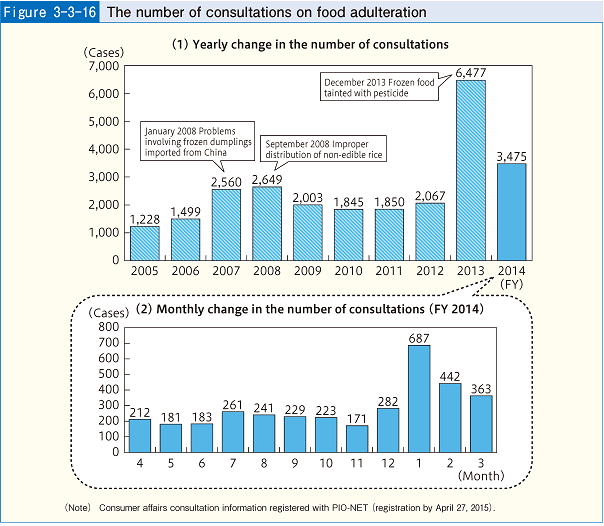Recent trends in consumer issues
Part 1 : Today's consumer issues and consumers' behavior/attitude
Chapter 3 : Trends in consumer issues
Section 3 : Recent trends in consumer issues
Consultations on telecommunications services increased further
- Consultations on telecommunications services, such as mobile phones and Internet connection lines, increased further in FY 2014.
- In particular, the growth of consultations on Internet connection lines was remarkable.
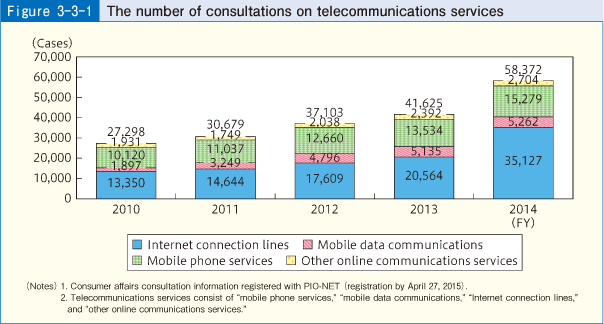
A surge in problems in which Internet providers were changed by remote control
- A type of problem on which consultations surged in FY 2014 was computers remotely controlled by businesses after users change Internet provider contracts.
- In typical cases, consumers receive telemarketing calls and are solicited to change Internet provider contracts to cut their subscription charges. After consumers operate their computers as told by the telemarketing representatives, the computers are remotely controlled by these operators. Consequently, in many consultation cases, consumers found themselves having signed up with another Internet provider, resulting in double-contracting or higher subscription charges.
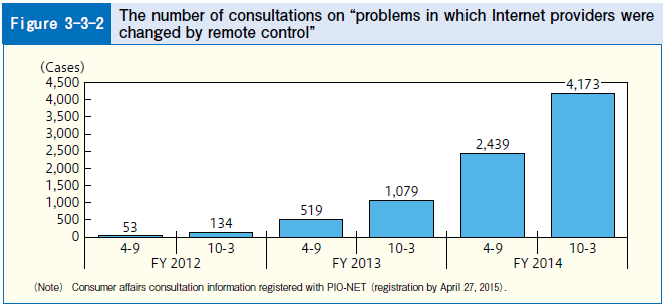
Problems associated with adult websites increased
- In FY 2014, consultations on adult websites were received from a wide range of age groups and were well above the FY 2013 level in number, reaching about 110,000 cases.
- In typical consultations, consumers asked about what to do when they were registered as members while attempting to access a free adult website and were asked to pay about 100,000円 membership fees.
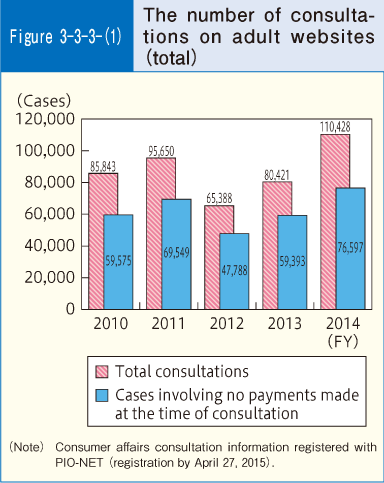
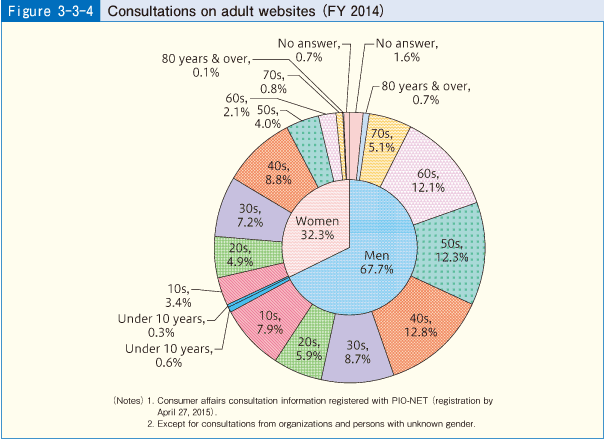
Payments are becoming higher in problems associated with adult websites
- The increase in the number of consultations on adult websites is mainly attributable to a wider opportunity to access such websites due to the spread of smartphones even to older generations.
- The average value of payment calculated from consultation cases in which payments have been made has become higher.
- A new tactic has emerged in which prepaid cards are exploited as the payment method.
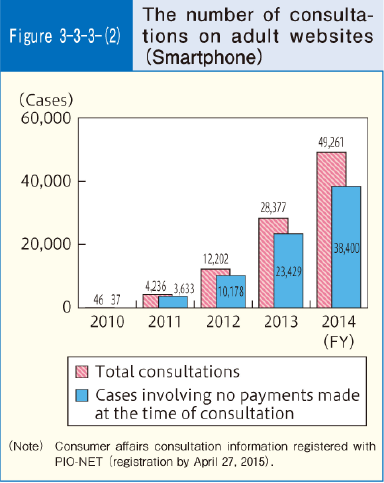
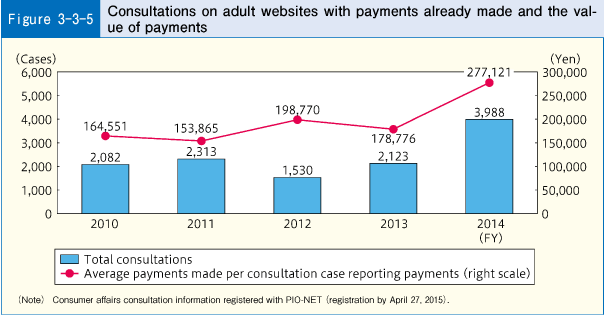
New tactics exploiting cashless payment methods, especially prepaid cards, has emerged
- Consumers are more frequently using cashless payments, such as payment by credit cards and electronic money (typically prepaid cards), which are increasingly becoming common for their ability to allow consumers to pay by cards or smartphones instead of carrying cash.
- Along with this trend, new fraudulent tactics have emerged recently, in which dishonest businesses lead consumers to purchase prepaid cards and defraud them of the value of the cards (face value).
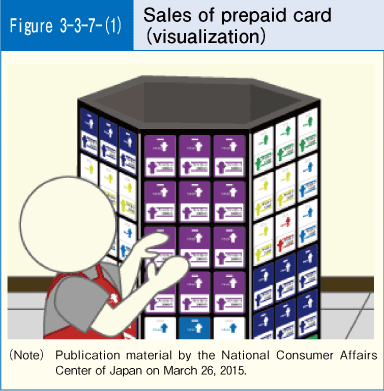
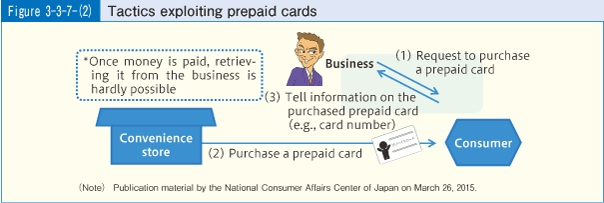
SNS-related consultations increased even among middle-aged and elderly consumers
- Consumer affairs consultations involving social networking services (SNS) to any extent are growing. The number in FY 2014 was 46% more than that in FY 2013.
- Due to the widespread use of SNS, associated consultations have increased in a wide range of age groups. From FY 2009 to FY 2014, the number of SNS-related consultations increased as much as 6.2-fold among those in their 40s to 60s, while the figure grew 2.1-fold among those in their 20s and younger.
- The subject of consultation varied widely, such as "A person I met via SNS guided me to a dating website," "I have signed up to purchase health food regularly before I knew, after I tried it for free from an advertisement on SNS," and "A friend on SNS turned out to be a stranger using stolen identity."
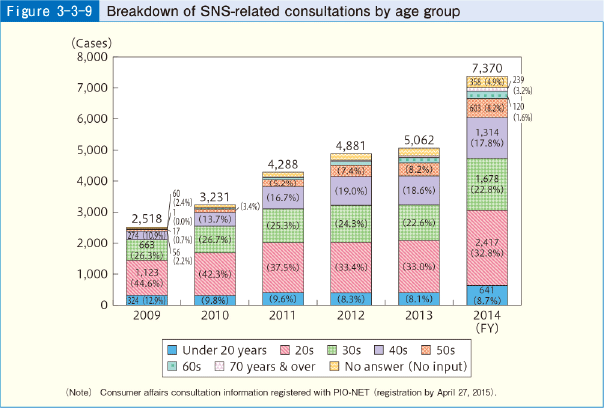
Consultations on fraudulent tactics used on the elderly increased
- Consultations on fraudulent tactics used on the elderly are increasing in number.
- Although in fewer cases, payments have been made at the time of consultation, the average payment made per consultation case remains high.
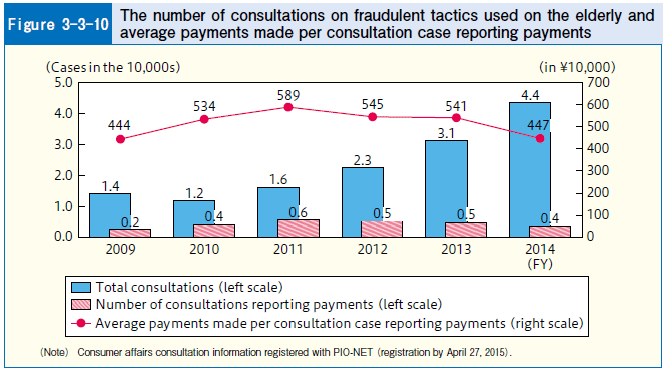
A growing part of theatrical solicitation problems involve the elderly
- The number of consultations on theatrical solicitation problems remains large, although it declined in the latter half of FY 2014. A growing part of them involve the elderly.
- Many consultations are pertaining to financial products such as fund-type investment products and public & corporate bonds.
- A notable trend in FY 2014 was the increase in the number of consultations on theatrical solicitation not involving financial products. For example, some consumers were offered to delete leaked personal information or to recover losses from past investment frauds.
* "Theatrical solicitation" is a tactic in which multiple businesses play different roles, such as sending brochures and making solicitation calls, to convince consumers that they can benefit from proposed offers and to make them decide to purchase financial products or other things of uncertain nature.
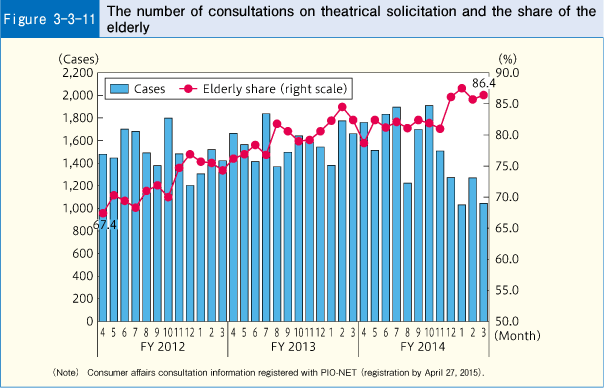
Problems arising from fraudulent offers to delete leaked personal information increased
- In a fraudulent tactic that rapidly spread in FY 2014, consumers are typically offered to delete their leaked personal information on the telephone from a person claiming to represent a public body and are eventually defrauded of money.
- There were also some tactics that took advantage of an incident in July 2014 in which a company leaked enormous amounts of personal information it had held.
- Many of these cases involve elderly women.
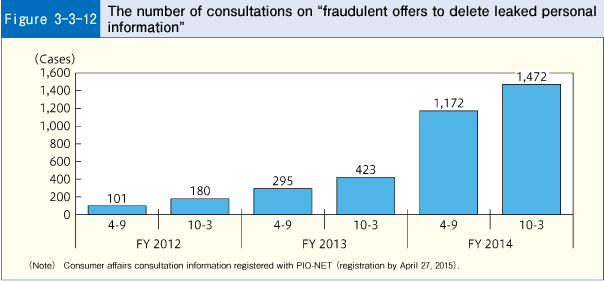
Consultations on food adulteration temporarily increased
- From the end of 2014 to early 2015, the media reported a series of food adulteration cases involving instant noodles, food served at fast food restaurants, and retort food.
- Along with this, consultations to local consumer affairs centers on food adulteration surged in January 2015.
